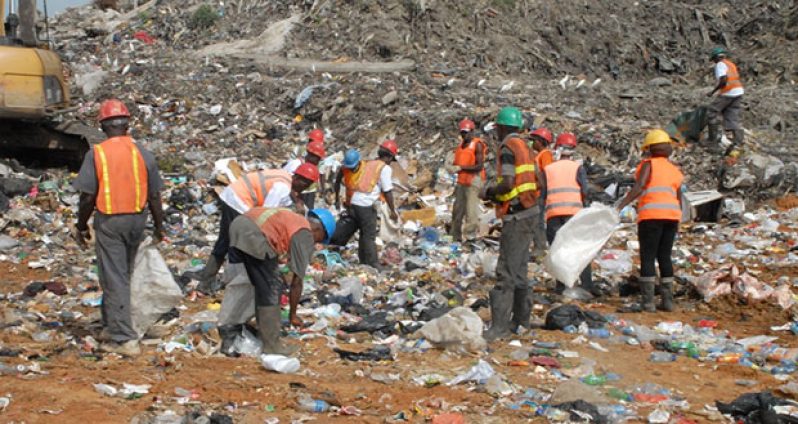THE Haags Bosch Sanitary Landfill represents a significant improvement in the way Guyana’s solid waste is disposed. Now, solid waste is contained in a landfill, and not dumped, as obtained before, at the Mandela Avenue dumpsite.
The difference between the two waste disposal techniques is substantial, and marks a crucial turning point, both technically and culturally, in waste management. Not only is the Landfill specially constructed to safely contain

waste and leachate, but its design and operation also help reduce the incidence of pests and bad odours.
The Haags Bosch Sanitary Landfill also allows for the better control of the waste taken there, as this may be separated according to type, and disposed of appropriately. This controlled separation of waste also allows for the accumulation of data on the different types of waste being disposed of that may lead to the development and implementation of important national solid waste disposal policies, like one on recycling, to better deal with Guyana’s growing problem of disposing of plastics, particularly soft drink and water bottles. Further, plastics, metal, glass and certain other materials have value and their recovery for reuse and recycling and can have economic and social benefits.
NEED FOR CULTURAL CHANGE
A recently-purchased landfill compactor that will soon be in use at the Haags Bosch Sanitary Landfill will provide significant improvements. Compactors, such as this one, compress more waste into the same volume in a landfill, thereby extending the capacity and life of the landfill, as well as reducing odour and leachate emissions and improving the operation of the landfill on the whole.
Apart from these important environmental benefits, the more densely compacted waste will degrade more efficiently, thereby creating the opportunity for economic benefits, like electricity production from the methane gas produced when the waste decomposes.
However, as Minister of Local Government and Regional Development, Norman Whittaker, points out, although the transition from waste disposal at Le Repentir dumpsite to the Haags Bosch Sanitary Landfill was quickly effected, an accompanying cultural change, involving not only the Landfill’s management team but the waste collectors and generators as well, is also a necessary, long-term part of this transition.
Such a change, Minister Whitaker notes, is therefore needed in the attitudes and habits related to proper waste disposal that prevail in Guyana. For example, many citizens are not used to separating their waste, and therefore cannot reap the possible benefits that can come from recycling waste.
Further, by not separating the commercial, industrial and hazardous waste from the household waste they collect, local waste collectors create environmental and operational challenges for the Landfill. In addition, many of the country’s commercial and industrial enterprises do not properly store the waste they generate, often mixing recyclables and hazardous waste that makes it difficult to dispose of these different waste types in an environmentally-sound manner.
One way in which citizens can help with solid waste management is by separating the organic part of their household waste, and composting it. Almost half of a typical Guyanese household’s waste is organic. By separating this organic waste for composting, citizens can significantly reduce the amounts of household waste taken to the Landfill for disposal.
Another benefit of composting is that its product, compost, is a rich soil enhancer. The Clean, Green Guyana Campaign, being administered by the Ministry of Local Government and Regional Development and funded by the Inter-American Development Bank (IDB), is currently conducting a pilot with residents of Mocha, Friendship on the East Bank Demerara ( EBD), and of Mon Repos on the East Coast Demerara (ECD).
A controlled landfill can therefore be an extremely important starting point to progressive change throughout the entire waste management system, resulting in environmentally-sound waste management practices by the enforcement of waste acceptance procedures and controls.
RESISTANCE TO CHANGE
However, some of these procedures and controls have been met with opposition from some sections of the society. For example, numerous requests have been made for extended opening hours at the Haags Bosch Landfill to accommodate the waste collectors. But unlike a dumpsite, the extended, even continuous, operation of the Haags Bosch Landfill would be detrimental, as the Landfill requires time for properly dealing with leachate, adequate compaction and covering at the end of the day that would not be possible with extended waste disposal hours.
For this reason, waste collectors, and citizens in general, should adapt to the Landfill’s opening hours, in the interest of having a better landfill by properly storing their waste in suitable receptacles until the scheduled waste collection occurs.
Still, these initial and expected “teething problems” of the new and modern waste management system can be overcome by the continuous efforts of the relevant authorities, and the increasing understanding and cooperation of the Guyanese public. In this perspective, the Haags Bosch Sanitary Landfill can make an even more significant contribution to having a cleaner, greener Guyana.




.png)









